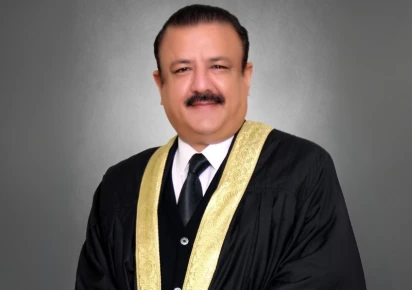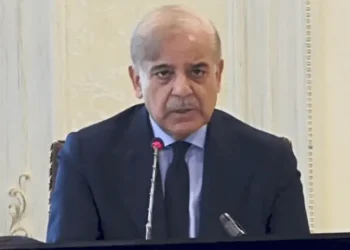KARACHI; A day after noisy protests and disruptions at the Sindh High Court (SHC), the written order of a two-judge bench dismissed seven petitions challenging the cancellation of Justice Tariq Mehmood Jahangiri’s law degree, citing non-prosecution and deliberate obstruction by lawyers.
The bench, comprising Justice Mohammad Karim Khan Agha and Justice Adnan-ul-Karim Memon, observed that the court “cannot be held hostage to the whims and wishes of the advocates as to the manner in which the petitions shall be heard.” The judges stressed that it is for the court alone to regulate proceedings and not for lawyers to dictate.
On Thursday, chaos erupted inside and outside the SHC courtroom after the bench declined Justice Jahangiri’s request to become a party in the proceedings. Instead, the judges ruled that they would first decide the maintainability of the petitions before considering any intervention application.
This triggered strong opposition from petitioners’ counsels, who objected to the bench’s jurisdiction and demanded that their preliminary objections be decided first.
Dozens of lawyers packed the courtroom, some shouting slogans and clapping in protest. Outside the SHC, a group staged a demonstration against one of the judges, while the petitioners and their lawyers staged a walkout after their objections were not addressed.
In its written order, the SHC recorded that when Advocate Ebrahim Saifuddin was called to argue on the maintainability of a petition, he declined and insisted that the court first rule on objections raised by Advocates Salahuddin Ahmed and Faisal Siddiqui.
When the bench refused, Saifuddin left the courtroom. Similarly, Advocate Siddiqui also refused to argue on maintainability and walked out. Advocate Salahuddin Ahmed too declined to proceed, insisting his earlier objections against a September 22 order be decided first.
The order further noted that in some petitions, the counsels were absent and may have left the courtroom. The bench concluded that the petitioners had been given ample opportunity to argue but “deliberately” chose not to, amounting to non-prosecution. As a result, all seven petitions were dismissed.
The judges also dismissed Justice Jahangiri’s request to intervene. While noting that he addressed the court “with dignity and patience,” the order said he did not argue on the merits of any listed application and eventually left the courtroom as well.
The SHC observed that the petitioners and the intervener had “wilfully refused to pursue the matter,” describing their conduct as “a gross abuse of the process of the court.” The order added that under Article 199 of the Constitution, superior courts have inherent powers to dismiss petitions for default when there is a persistent lack of diligence.
The bench also censured the behavior of protesting lawyers, stating that raising slogans against the judiciary and disrupting decorum was “highly unbecoming” and prima facie contempt of court. However, the judges said they would show restraint and not issue contempt notices. The court directed the registrar to preserve CCTV and audio recordings of the September 25 proceedings.
The petitions had been filed last year by various bar associations, lawyers, and a KU syndicate member, challenging the University of Karachi’s Syndicate and Unfair Means Committee decision that cancelled Justice Jahangiri’s degree. The case originated from a letter that surfaced on social media, purportedly from KU’s controller of examinations, leading to a broader inquiry.
Last year, the SHC had suspended KU’s decision through an interim order, observing that Justice Jahangiri had not been heard before the cancellation of his degree. The matter resurfaced when the Sindh Higher Education Commission (SHEC) moved for the vacation of that stay, prompting Thursday’s dramatic proceedings.





































































